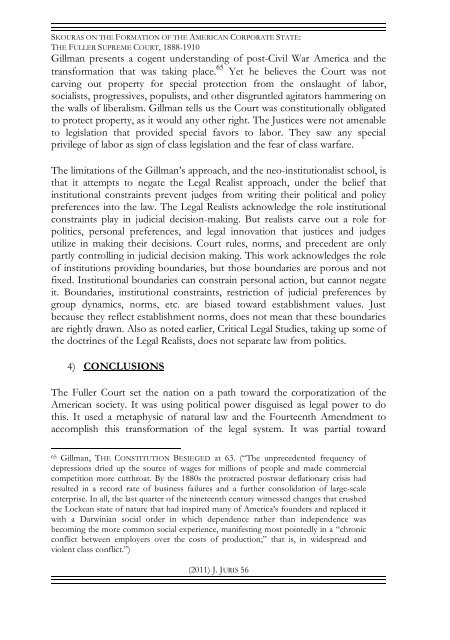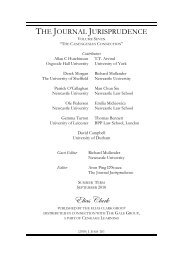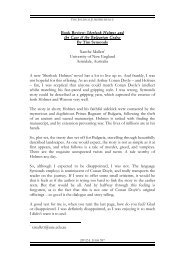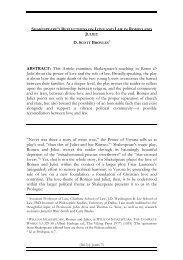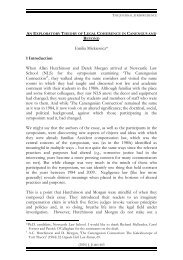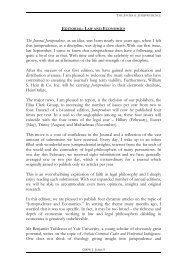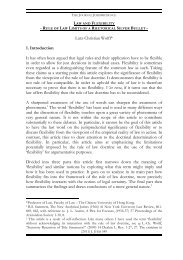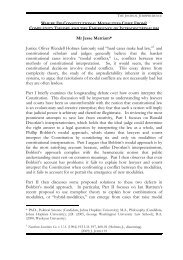On the Formation of the American Corporate State - The Journal ...
On the Formation of the American Corporate State - The Journal ...
On the Formation of the American Corporate State - The Journal ...
You also want an ePaper? Increase the reach of your titles
YUMPU automatically turns print PDFs into web optimized ePapers that Google loves.
SKOURAS ON THE FORMATION OF THE AMERICAN CORPORATE STATE:THE FULLER SUPREME COURT, 1888-1910Gillman presents a cogent understanding <strong>of</strong> post-Civil War America and <strong>the</strong>transformation that was taking place. 65 Yet he believes <strong>the</strong> Court was notcarving out property for special protection from <strong>the</strong> onslaught <strong>of</strong> labor,socialists, progressives, populists, and o<strong>the</strong>r disgruntled agitators hammering on<strong>the</strong> walls <strong>of</strong> liberalism. Gillman tells us <strong>the</strong> Court was constitutionally obligatedto protect property, as it would any o<strong>the</strong>r right. <strong>The</strong> Justices were not amenableto legislation that provided special favors to labor. <strong>The</strong>y saw any specialprivilege <strong>of</strong> labor as sign <strong>of</strong> class legislation and <strong>the</strong> fear <strong>of</strong> class warfare.<strong>The</strong> limitations <strong>of</strong> <strong>the</strong> Gillman’s approach, and <strong>the</strong> neo-institutionalist school, isthat it attempts to negate <strong>the</strong> Legal Realist approach, under <strong>the</strong> belief thatinstitutional constraints prevent judges from writing <strong>the</strong>ir political and policypreferences into <strong>the</strong> law. <strong>The</strong> Legal Realists acknowledge <strong>the</strong> role institutionalconstraints play in judicial decision-making. But realists carve out a role forpolitics, personal preferences, and legal innovation that justices and judgesutilize in making <strong>the</strong>ir decisions. Court rules, norms, and precedent are onlypartly controlling in judicial decision making. This work acknowledges <strong>the</strong> role<strong>of</strong> institutions providing boundaries, but those boundaries are porous and notfixed. Institutional boundaries can constrain personal action, but cannot negateit. Boundaries, institutional constraints, restriction <strong>of</strong> judicial preferences bygroup dynamics, norms, etc. are biased toward establishment values. Justbecause <strong>the</strong>y reflect establishment norms, does not mean that <strong>the</strong>se boundariesare rightly drawn. Also as noted earlier, Critical Legal Studies, taking up some <strong>of</strong><strong>the</strong> doctrines <strong>of</strong> <strong>the</strong> Legal Realists, does not separate law from politics.4) CONCLUSIONS<strong>The</strong> Fuller Court set <strong>the</strong> nation on a path toward <strong>the</strong> corporatization <strong>of</strong> <strong>the</strong><strong>American</strong> society. It was using political power disguised as legal power to dothis. It used a metaphysic <strong>of</strong> natural law and <strong>the</strong> Fourteenth Amendment toaccomplish this transformation <strong>of</strong> <strong>the</strong> legal system. It was partial toward65 Gillman, THE CONSTITUTION BESIEGED at 63. (“<strong>The</strong> unprecedented frequency <strong>of</strong>depressions dried up <strong>the</strong> source <strong>of</strong> wages for millions <strong>of</strong> people and made commercialcompetition more cutthroat. By <strong>the</strong> 1880s <strong>the</strong> protracted postwar deflationary crisis hadresulted in a record rate <strong>of</strong> business failures and a fur<strong>the</strong>r consolidation <strong>of</strong> large-scaleenterprise. In all, <strong>the</strong> last quarter <strong>of</strong> <strong>the</strong> nineteenth century witnessed changes that crushed<strong>the</strong> Lockean state <strong>of</strong> nature that had inspired many <strong>of</strong> America’s founders and replaced itwith a Darwinian social order in which dependence ra<strong>the</strong>r than independence wasbecoming <strong>the</strong> more common social experience, manifesting most pointedly in a “chronicconflict between employers over <strong>the</strong> costs <strong>of</strong> production;” that is, in widespread andviolent class conflict.”)(2011) J. JURIS 56


